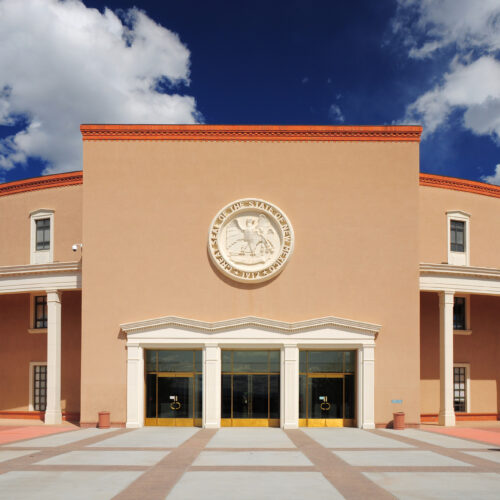New Mexico legislature begins work on public defender commission bill

Pleading the Sixth: On November 6, 2012, the New Mexico electorate passed a constitutional amendment requiring the creation of an independent public defender commission. In anticipation of the next legislative session, the House Committee for the Courts, Corrections and Justice held an initial hearing on November 30th to debate a new commission’s appointing authorities and duties. Despite the constitutional amendment, the road forward still remains unclear.
On November 30, 2012, the New Mexico House Committee for the Courts, Corrections, and Justice held an initial hearing on the creation of an independent public defender commission, as required by a constitutional amendment supported by a majority of the New Mexico electorate. [The constitutional amendment was approved by 399,428 of 644,381 (62%) of New Mexico voters on November 6, 2012. For information on the need for a constitutional amendment to ensure the independence of the public defender department, click here.] The discussion during the initial hearing centered on a 2008 bill that took careful aim to meet all pertinent national standards in relation to the independence of the defense function, but was ultimately vetoed by then-Governor Bill Richardson. A significant part of the hearing was spent debating potential hurdles that still await the reform effort to make the public defender department independent.
National standards on independence
The American Bar Association’s Ten Principles of a Public Defense Delivery System, explicitly requires that the “public defense function, including the selection, funding, and payment of the defense counsel, is independent.” In the commentary to this standard, the American Bar Association (ABA) notes that in addition to public defenders being “subject to judicial supervision only in the same manner and to the same extent as retained counsel” the public defense function should also “be independent from political influence” as well. ABA Principle 1 commentary specifically recommends to “safeguard independence and to promote the efficiency and quality of services, a nonpartisan board should oversee defender, assigned counsel, or contract systems.”
Footnotes to ABA Principle 1 refer to National Study Commission on Defense Services’ Guidelines for Legal Defense Systems in the United States (1976). The Guidelines were created in consultation with the United States Department of Justice (DOJ) under a DOJ Law Enforcement Assistance Administration (LEAA) grant. Guideline 2.10 (The Defender Commission) states that a special Defender Commission should be established for every defender system, whether public or private,” and that the primary consideration of appointing authorities should be “ensuring the independence of the Defender Director.”
The same National Study Commission (NSC) Guideline states that defender commissions should “consist of from nine to thirteen members,” made up of a “diversity of factions in order to ensure insulation from partisan politics.” Specifically, “[n]o single branch of government should have a majority vote on the commission.” To avoid conflicts of interests the NSC Guidelines require that the “Commission should not include judges, prosecutors, or law enforcement officials.”
“The primary function of the Defender Commission should be to select the State Defender Director (Guideline 2.11),” and the commission should not “interfere with the discretion, judgment and zealous advocacy of defender attorneys in specific cases. “ Guideline 2.12 states that the defender director should serve for a term of between 4-6 years and should never be removed from office “without a hearing procedure at which good cause is shown.”
What the 2008 commission bill says
The 2008 bill discussed by the House committee has a public defender commission consisting of eleven members, with appointments made by a diversity of factions. The Governor will get two appointments, “one of whom shall be a member of an organization that advocates on behalf of persons with mental illness.” The Chief Justice also makes two appointments, “one of whom shall be a member of an organization that advocates on behalf of homeless persons.” The Dean of the University of New Mexico, School of Law gets two appointments. One of the Dean’s appointments must be a member of an organization that “advocates on behalf of an ethnic minority” and another appointment must be from a county with a population less than 120,000 [only 4 of New Mexico’s 33 counties have populations greater than this threshold: Bernalillo County (Albuquerque), Dona Ana County (Las Cruces), San Juan County (Aztec) and Santa Fe County (Santa Fe)]. One appointment made by the president of the State Bar of New Mexico also must be from a county of less than 120,000 people. The Speaker of the House and the President Pro Tempore of the Senate each get to appoint one member of their respective chambers to the commission. The New Mexico Criminal Defense Lawyers Association and the Juvenile Justice Advisory Committee would each get a single appointment.
Importantly, members of the commission must have “significant experience in the defense of criminal or juvenile justice cases,” or have “demonstrated a commitment to quality indigent defense representation or to working with and advocating for the population served by” the public defender department. In addition, the 2008 discussion bill follows national standards by prohibiting current prosecutors, law enforcement officials, judges, and judicial officers (or any employee of any of said officials) from serving on the committee. And, in following national trends, the 2008 bill also bans current public defenders, other employees of the public defender, and “[p]ersons who currently contract with or receive funding from” the public defender department.
As proposed, the new commission is mandated to promulgate standards related to: attorney qualification and training, evaluation and supervision of contract and staff attorneys, “ethically responsible caseload and workload levels,” and the parameters of ethical performance.
The commission is charged under the 2008 bill with appointing a “chief for a term of four years” and the commission can only terminate the chief for “incompetence, neglect of duty or malfeasance.” And, whereas the Governor currently holds the authority to hire and fire not only the chief but also all public defender department heads, the new discussion bill cedes all authority for hiring and firing of staff to the chief public defender.
Potential hurdles moving forward
Despite the passage of the constitutional amendment requiring the creation of an independent public defender commission and despite the initial work of the New Mexico legislature at the end of November, there are many hurdles still to come. To begin with, there is no fast track process to get the bill passed. It still needs to have both chambers of the legislature approve it and have the governor sign it. There is no precedent for what happens should the legislature pass the state constitutionally mandated legislation only to have the governor veto it. Should that scenario play out, it will most likely be a matter for the courts to settle.


